Books on consciousness
A list of books relating to the hard problem of consciousness. Regularly updated cos I keep finding new stuff all the time.
A list of books relating to the hard problem of consciousness. Regularly updated cos I keep finding new stuff all the time.
2001
 Marc Slors
Marc Slors
The Diachronic Mind: An Essay on Personal Identity, Psychological Continuity and the Mind-Body Problem
(Springer 2001)
Slors traces traditional problems facing psychological-continuity theories of personal identity to a naive physicalism about the mind and suggests that such theories are better underwritten by an “essentially diachronic” conception of the mind. He also develops an unorthodox version of non-reductive physicalism that avoids traditional worries of epiphenomenalism. See Springer | Amazon | Google | academia.edu
 Mark F. Sharlow
Mark F. Sharlow
From Brain to Cosmos
(Universal Publishers 2001)
Sharlow shows that we can learn much about the mind-brain puzzle, the reality of time, and the justification of religious belief, by trying to answer one question about conscious beings and the world in which they live, namely: how much can we learn about the world by tracing the logical consequences of facts about how things appear? See Mark Sharlow’s website | Amazon | Google
 Chris Moore & Karen Lemmon (eds.)
Chris Moore & Karen Lemmon (eds.)
The Self in Time: Developmental Perspectives
(Lawrence Erlbaum 2001)
Children first construct the notion of a temporally-extended self during the preschool period. By about four years of age, they know that past events in which they participated affect present circumstances. They can also imagine the future and make decisions designed to bring about desirable future events even in the face of competing immediate gratification. This book brings together the leading researchers on these issues and illustrates for the first time how a unified approach based on the idea of a temporally extended self can integrate these topics. See Amazon | Google
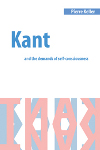 Pierre Keller
Pierre Keller
Kant and the Demands of Self-Consciousness
(Cambridge 2001)
Keller examines Kant’s theory of self-consciousness and argues that it succeeds in explaining how both subjective and objective experience are possible. Previous interpretations have held that Kant treats all self-consciousness as knowledge of objective states of affairs, and also that self-consciousness can be interpreted as knowledge of personal identity. By developing this striking new interpretation Keller is able to argue that transcendental self-consciousness underwrites a general theory of objectivity and subjectivity at the same time. See Cambridge | Amazon | Google
 Mark Rowlands
Mark Rowlands
The Nature of Consciousness
(Cambridge 2001)
Rowlands develops an innovative and radical account of the nature of phenomenal consciousness, with significant consequences for attempts to find a place for it in the natural order. He argues that the phenomenal aspects of conscious experience are aspects that exist only in the directing of experience towards non-phenomenal objects, a theory that undermines reductive attempts to explain consciousness in terms of what is not conscious. His book will be of interest to a wide range of readers in the philosophy of mind and language, psychology, and cognitive science. See Cambridge | Amazon | Google
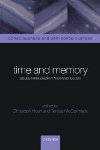 Christoph Hoerl & Teresa McCormack (eds.)
Christoph Hoerl & Teresa McCormack (eds.)
Time and Memory: Issues in Philosophy and Psychology
(Oxford 2001)
The capacity to represent and think about time, and the capacity to recollect the past are two of the most fundamental and least understood aspects of human cognition and consciousness. This book throws new light on central issues in the study of the mind by uniting, for the first time, psychological and philosophical approaches dealing with the connection between temporal representation and memory. Fifteen specially written essays by leading psychologists and philosophers investigate the way in which time is represented in memory, and the role memory plays in our ability to reason about time. See Oxford | Amazon | Google
 Samuel Todes
Samuel Todes
Body and World
(MIT 2001)
The definitive edition of a book that should now take its place as a major contribution to contemporary existential phenomenology. Todes goes beyond Heidegger and Merleau-Ponty in his description of how independent physical nature and experience are united in our bodily action. His account allows him to preserve the authority of experience while avoiding the tendency toward idealism that threatens both Heidegger and Merleau-Ponty. See MIT | Amazon | Google
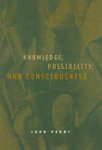 John Perry
John Perry
Knowledge, Possibility, and Consciousness
(MIT 2001)
If everything in the universe is physical, our consciousness and feelings must also be physical. Ever since Descartes formulated the mind-body problem, a long line of philosophers has found this “physicalist view” to be preposterous. According to Perry, the history of the mind-body problem is, in part, the slow victory of physical monism over various forms of dualism, each new version of which claims that surely something more is going on with us than the merely physical. See MIT | Google
 John E. Harrison
John E. Harrison
Synaesthesia: The Strangest Thing
(Oxford 2001)
Synaesthesia is a confusion of the senses, whereby stimulation of one sense triggers stimulation in another. Harrison takes us on a fascinating tour of this mysterious condition, looking at historical incidences of synaesthesia, unraveling the theories for the condition, and examining the claims to synaesthesia of the likes of Rimbaud, Baudelaire, and others. The result is an exciting, yet scientific account of an incredible condition – a world of unbelievable sensory experiences. See Oxford | Google
 Igor Aleksander
Igor Aleksander
How to Build a Mind
(Columbia 2001)
Aleksander heads a British team that uses engineering principles to understand the brain. The team has built several machines, culminating in MAGNUS, “a machine with imagination.” When asked to produce an image of a banana that is blue with red spots, it appears on the screen in seconds. Weaving personal anecdotes with imagined dialogues between historical figures, Aleksander leads readers toward an understanding of consciousness. See Columbia | Google
 Carl Gillett & Barry Loewer (eds.)
Carl Gillett & Barry Loewer (eds.)
Physicalism and its Discontents
(Cambridge 2001)
Physicalism is the philosophical view that everything in the space-time world is ultimately physical. This collection offers fresh perspectives on this important doctrine and brings new depth and breadth to the philosophical debate. A group of distinguished philosophers consider a wide range of issues including the historical genesis and present justification of physicalism, its metaphysical presuppositions and methodological role, its implications for mental causation, and the account it provides of consciousness. See Cambridge | Google
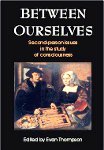 Evan Thompson (ed.)
Evan Thompson (ed.)
Between Ourselves: Second-Person Issues in the Study of Consciousness
(Imprint 2001)
The first volume in this series (The View from Within, 1999) was a study of first-person approaches to consciousness. Second-person ‘I–You’ relations are central to human life yet have been neglected in consciousness research. This volume aims to redress this imbalance with a variety of viewpoints on various facets of intersubjective experience. See Imprint | Google
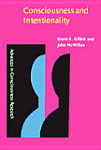 Grant R. Gillett & John McMillan
Grant R. Gillett & John McMillan
Consciousness and Intentionality
(John Benjamins 2001)
Is there an internal relation between consciousness and intentionality? Can mental content be described so as to avoid dualism? What is the influence of social context upon consciousness, conceptions of self and mental content? This book considers such questions and argues for a conception of consciousness, mental content and intentionality that is anti-Cartesian in its major tenets. See John Benjamins | Amazon | Google
 Donald R. Griffin
Donald R. Griffin
Animal Minds: Beyond Cognition to Consciousness
(U Chicago Press 2001)
With this revised and updated edition of his classic book, Griffin moves beyond considerations of animal cognition to argue that scientists can and should investigate questions of animal consciousness. With examples from chimpanzees and dolphins to birds and honeybees, he shows how communication among animals can serve as a “window” into what animals think and feel, and explores the profound philosophical and ethical implications of these considerations. See U Chicago Press | Google | Amazon
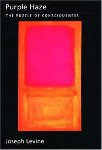 Joseph Levine
Joseph Levine
Purple Haze
(Oxford 2001)
Joseph Levine explores the mind-body dilemma, presenting the first book-length treatment of his highly influential ideas on the “explanatory gap.” He presents a careful argument that there is such a gap, and, after providing intriguing analyses of virtually all existing theories of consciousness, shows that recent attempts to close it fall short of the mark. Levine concludes that in the foreseeable future consciousness will remain a mystery. See Oxford | Google | Amazon
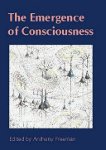 Anthony Freeman (ed.)
Anthony Freeman (ed.)
The Emergence of Consciousness
(Imprint 2001)
How does the conscious mind relate to the physical body? Two common views offer the stark choice between dualism which said mind and body were quite separate and physicalism which said that the mind was in fact ‘nothing but’ the physical brain. Emergence theory offers a compromise: the mind ‘emerges’ from the physical body but the whole person, mind and body, is more than the sum of the physical parts. In the first essay, Robert Van Gulick gives an overview and comparison of the current ‘emergent’ and ‘reductive’ approaches. Other contributors discuss more detailed aspects of the subject. See Imprint | Google | Amazon
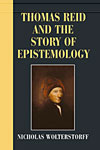 Nicholas Wolterstorff
Nicholas Wolterstorff
Thomas Reid and the Story of Epistemology
(Cambridge 2001)
The two great philosophical figures at the culminating point of the Enlightenment were Thomas Reid and Immanuel Kant. Reid was the more influential but his fame and influence were eclipsed by his German contemporary. See Cambridge University Press | Amazon | Google Books
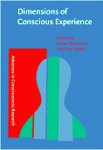 P. Pylkkänen & T. Vadén (eds.)
P. Pylkkänen & T. Vadén (eds.)
Dimensions of Conscious Experience
(John Benjamins 2001)
Based on a workshop at the University of Skövde, Sweden, this collection provides a microcosm of the emerging discipline of consciousness studies and focuses on some important but neglected aspects of consciousness. Includes critical studies of subjectivity vs objectivity, nonconceptuality vs conceptuality, language, evolutionary aspects, neural correlates, microphysical level, creativity, visual arts and dreams. See John Benjamins | Amazon | Google

The Diachronic Mind: An Essay on Personal Identity, Psychological Continuity and the Mind-Body Problem
(Springer 2001)
Slors traces traditional problems facing psychological-continuity theories of personal identity to a naive physicalism about the mind and suggests that such theories are better underwritten by an “essentially diachronic” conception of the mind. He also develops an unorthodox version of non-reductive physicalism that avoids traditional worries of epiphenomenalism. See Springer | Amazon | Google | academia.edu

From Brain to Cosmos
(Universal Publishers 2001)
Sharlow shows that we can learn much about the mind-brain puzzle, the reality of time, and the justification of religious belief, by trying to answer one question about conscious beings and the world in which they live, namely: how much can we learn about the world by tracing the logical consequences of facts about how things appear? See Mark Sharlow’s website | Amazon | Google

The Self in Time: Developmental Perspectives
(Lawrence Erlbaum 2001)

Children first construct the notion of a temporally-extended self during the preschool period. By about four years of age, they know that past events in which they participated affect present circumstances. They can also imagine the future and make decisions designed to bring about desirable future events even in the face of competing immediate gratification. This book brings together the leading researchers on these issues and illustrates for the first time how a unified approach based on the idea of a temporally extended self can integrate these topics. See Amazon | Google

Kant and the Demands of Self-Consciousness
(Cambridge 2001)
Keller examines Kant’s theory of self-consciousness and argues that it succeeds in explaining how both subjective and objective experience are possible. Previous interpretations have held that Kant treats all self-consciousness as knowledge of objective states of affairs, and also that self-consciousness can be interpreted as knowledge of personal identity. By developing this striking new interpretation Keller is able to argue that transcendental self-consciousness underwrites a general theory of objectivity and subjectivity at the same time. See Cambridge | Amazon | Google

The Nature of Consciousness
(Cambridge 2001)

Rowlands develops an innovative and radical account of the nature of phenomenal consciousness, with significant consequences for attempts to find a place for it in the natural order. He argues that the phenomenal aspects of conscious experience are aspects that exist only in the directing of experience towards non-phenomenal objects, a theory that undermines reductive attempts to explain consciousness in terms of what is not conscious. His book will be of interest to a wide range of readers in the philosophy of mind and language, psychology, and cognitive science. See Cambridge | Amazon | Google

Time and Memory: Issues in Philosophy and Psychology
(Oxford 2001)
The capacity to represent and think about time, and the capacity to recollect the past are two of the most fundamental and least understood aspects of human cognition and consciousness. This book throws new light on central issues in the study of the mind by uniting, for the first time, psychological and philosophical approaches dealing with the connection between temporal representation and memory. Fifteen specially written essays by leading psychologists and philosophers investigate the way in which time is represented in memory, and the role memory plays in our ability to reason about time. See Oxford | Amazon | Google

Body and World
(MIT 2001)
The definitive edition of a book that should now take its place as a major contribution to contemporary existential phenomenology. Todes goes beyond Heidegger and Merleau-Ponty in his description of how independent physical nature and experience are united in our bodily action. His account allows him to preserve the authority of experience while avoiding the tendency toward idealism that threatens both Heidegger and Merleau-Ponty. See MIT | Amazon | Google

Knowledge, Possibility, and Consciousness
(MIT 2001)

If everything in the universe is physical, our consciousness and feelings must also be physical. Ever since Descartes formulated the mind-body problem, a long line of philosophers has found this “physicalist view” to be preposterous. According to Perry, the history of the mind-body problem is, in part, the slow victory of physical monism over various forms of dualism, each new version of which claims that surely something more is going on with us than the merely physical. See MIT | Google

Synaesthesia: The Strangest Thing
(Oxford 2001)
Synaesthesia is a confusion of the senses, whereby stimulation of one sense triggers stimulation in another. Harrison takes us on a fascinating tour of this mysterious condition, looking at historical incidences of synaesthesia, unraveling the theories for the condition, and examining the claims to synaesthesia of the likes of Rimbaud, Baudelaire, and others. The result is an exciting, yet scientific account of an incredible condition – a world of unbelievable sensory experiences. See Oxford | Google

How to Build a Mind
(Columbia 2001)
Aleksander heads a British team that uses engineering principles to understand the brain. The team has built several machines, culminating in MAGNUS, “a machine with imagination.” When asked to produce an image of a banana that is blue with red spots, it appears on the screen in seconds. Weaving personal anecdotes with imagined dialogues between historical figures, Aleksander leads readers toward an understanding of consciousness. See Columbia | Google

Physicalism and its Discontents
(Cambridge 2001)
Physicalism is the philosophical view that everything in the space-time world is ultimately physical. This collection offers fresh perspectives on this important doctrine and brings new depth and breadth to the philosophical debate. A group of distinguished philosophers consider a wide range of issues including the historical genesis and present justification of physicalism, its metaphysical presuppositions and methodological role, its implications for mental causation, and the account it provides of consciousness. See Cambridge | Google

Between Ourselves: Second-Person Issues in the Study of Consciousness
(Imprint 2001)
The first volume in this series (The View from Within, 1999) was a study of first-person approaches to consciousness. Second-person ‘I–You’ relations are central to human life yet have been neglected in consciousness research. This volume aims to redress this imbalance with a variety of viewpoints on various facets of intersubjective experience. See Imprint | Google

Consciousness and Intentionality
(John Benjamins 2001)
Is there an internal relation between consciousness and intentionality? Can mental content be described so as to avoid dualism? What is the influence of social context upon consciousness, conceptions of self and mental content? This book considers such questions and argues for a conception of consciousness, mental content and intentionality that is anti-Cartesian in its major tenets. See John Benjamins | Amazon | Google

Animal Minds: Beyond Cognition to Consciousness
(U Chicago Press 2001)
With this revised and updated edition of his classic book, Griffin moves beyond considerations of animal cognition to argue that scientists can and should investigate questions of animal consciousness. With examples from chimpanzees and dolphins to birds and honeybees, he shows how communication among animals can serve as a “window” into what animals think and feel, and explores the profound philosophical and ethical implications of these considerations. See U Chicago Press | Google | Amazon

Purple Haze
(Oxford 2001)

Joseph Levine explores the mind-body dilemma, presenting the first book-length treatment of his highly influential ideas on the “explanatory gap.” He presents a careful argument that there is such a gap, and, after providing intriguing analyses of virtually all existing theories of consciousness, shows that recent attempts to close it fall short of the mark. Levine concludes that in the foreseeable future consciousness will remain a mystery. See Oxford | Google | Amazon

The Emergence of Consciousness
(Imprint 2001)
How does the conscious mind relate to the physical body? Two common views offer the stark choice between dualism which said mind and body were quite separate and physicalism which said that the mind was in fact ‘nothing but’ the physical brain. Emergence theory offers a compromise: the mind ‘emerges’ from the physical body but the whole person, mind and body, is more than the sum of the physical parts. In the first essay, Robert Van Gulick gives an overview and comparison of the current ‘emergent’ and ‘reductive’ approaches. Other contributors discuss more detailed aspects of the subject. See Imprint | Google | Amazon

Thomas Reid and the Story of Epistemology
(Cambridge 2001)

The two great philosophical figures at the culminating point of the Enlightenment were Thomas Reid and Immanuel Kant. Reid was the more influential but his fame and influence were eclipsed by his German contemporary. See Cambridge University Press | Amazon | Google Books

Dimensions of Conscious Experience
(John Benjamins 2001)
Based on a workshop at the University of Skövde, Sweden, this collection provides a microcosm of the emerging discipline of consciousness studies and focuses on some important but neglected aspects of consciousness. Includes critical studies of subjectivity vs objectivity, nonconceptuality vs conceptuality, language, evolutionary aspects, neural correlates, microphysical level, creativity, visual arts and dreams. See John Benjamins | Amazon | Google
Menu
 What’s a logical paradox?
What’s a logical paradox? Achilles & the tortoise
Achilles & the tortoise The surprise exam
The surprise exam Newcomb’s problem
Newcomb’s problem Newcomb’s problem (sassy version)
Newcomb’s problem (sassy version) Seeing and being
Seeing and being Logic test!
Logic test! Philosophers say the strangest things
Philosophers say the strangest things Favourite puzzles
Favourite puzzles Books on consciousness
Books on consciousness Philosophy videos
Philosophy videos Phinteresting
Phinteresting Philosopher biographies
Philosopher biographies Philosopher birthdays
Philosopher birthdays Draft
Draftbarang 2009-2024  wayback machine
wayback machine
 wayback machine
wayback machine